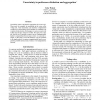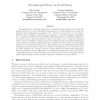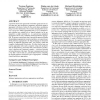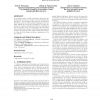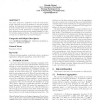119
click to vote
CORR
2002
Springer
15 years 1 months ago
2002
Springer
In multiagent settings where the agents have different preferences, preference aggregation is a central issue. Voting is a general method for preference aggregation, but seminal r...
101
click to vote
AI
2007
Springer
15 years 2 months ago
2007
Springer
Preference aggregation in a multiagent setting is a central issue in both human and computer contexts. In this paper, we study in terms of complexity the vulnerability of preferen...
103
click to vote
ECAI
2008
Springer
15 years 3 months ago
2008
Springer
Abstract. A common way of dealing with the paradoxes of preference aggregation consists in restricting the domain of admissible preferences. The most well-known such restriction is...
100
click to vote
AAAI
2007
15 years 4 months ago
2007
Uncertainty arises in preference aggregation in several ways. There may, for example, be uncertainty in the votes or the voting rule. Such uncertainty can introduce computational ...
102
click to vote
ATAL
2006
Springer
15 years 5 months ago
2006
Springer
Preferences of a single agent are often partially ordered. For example, it may be hard to compare a novel with a biography. In such a situation, the agent may want the novel and t...
113
click to vote
TARK
2005
Springer
15 years 7 months ago
2005
Springer
The aggregation of conflicting preferences is an important issue in human society and multiagent systems. Due to its universality, voting among a set of alternatives has a centra...
140
click to vote
ATAL
2007
Springer
15 years 8 months ago
2007
Springer
Agents that must reach agreements with other agents need to reason about how their preferences, judgments, and beliefs might be aggregated with those of others by the social choic...
104
click to vote
ATAL
2007
Springer
15 years 8 months ago
2007
Springer
In an election held in a noisy environment, agents may unintentionally perturb the outcome by communicating faulty preferences. We investigate this setting by introducing a theore...
100
click to vote
ATAL
2009
Springer
15 years 8 months ago
2009
Springer
The paper proposes a unification of the two main frameworks commonly used for the analysis of collective decisionmaking: the framework of preference aggregation, developed from t...

